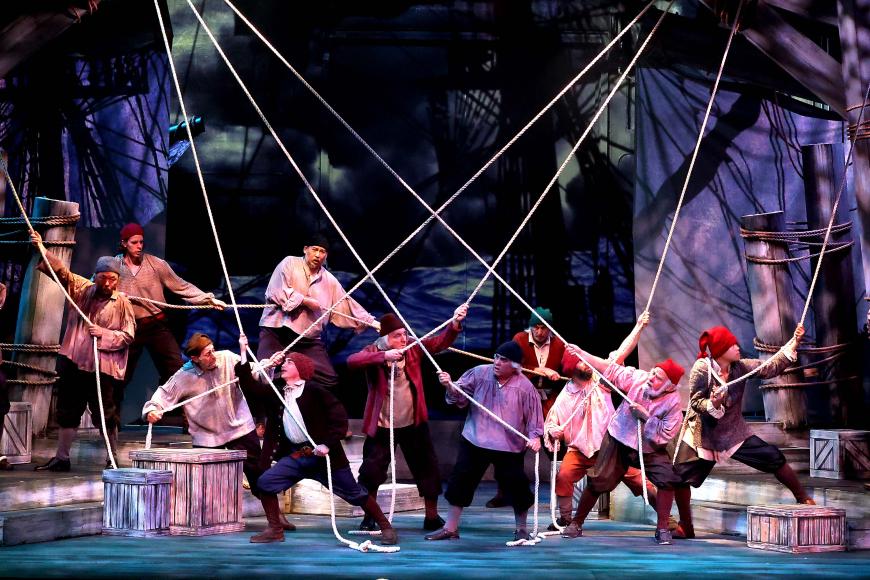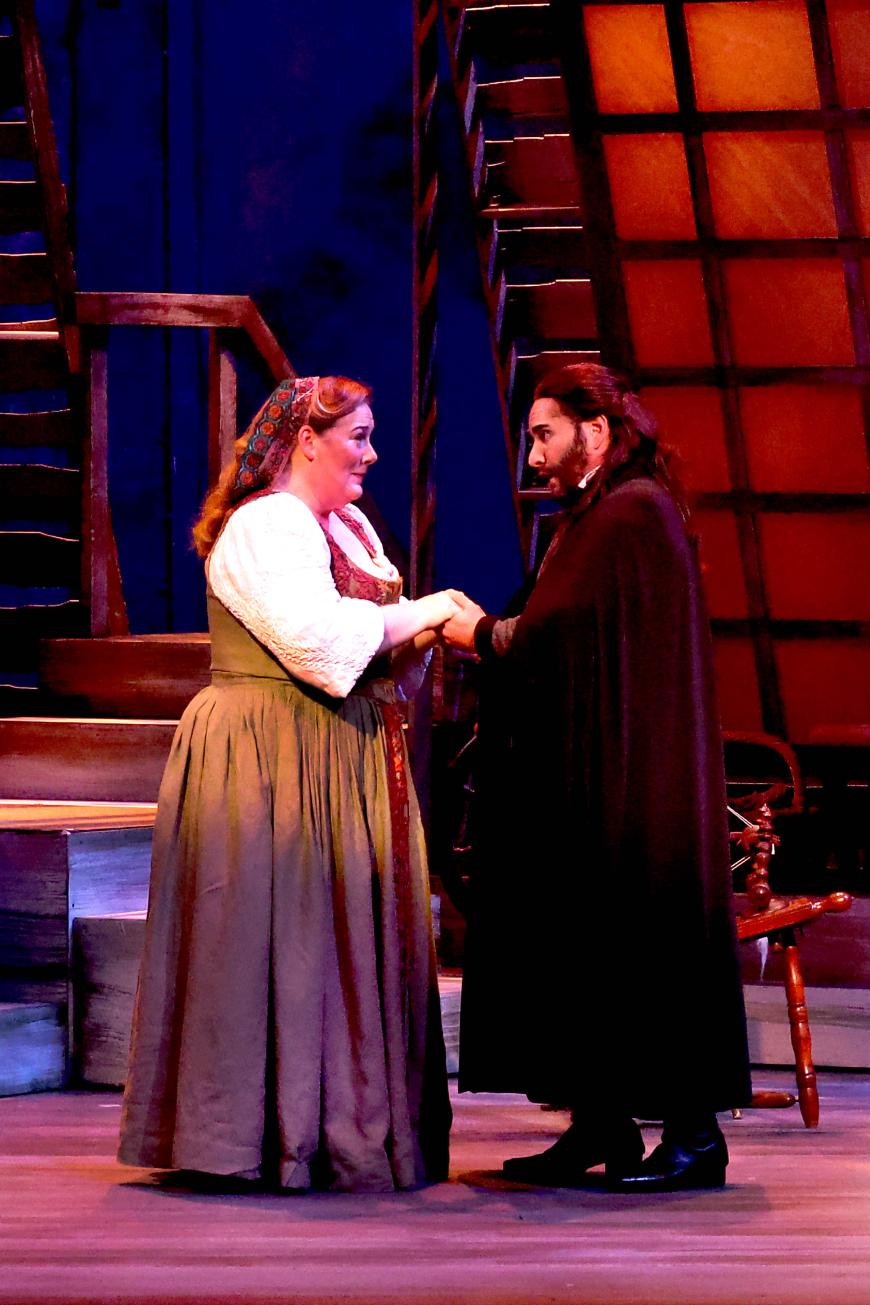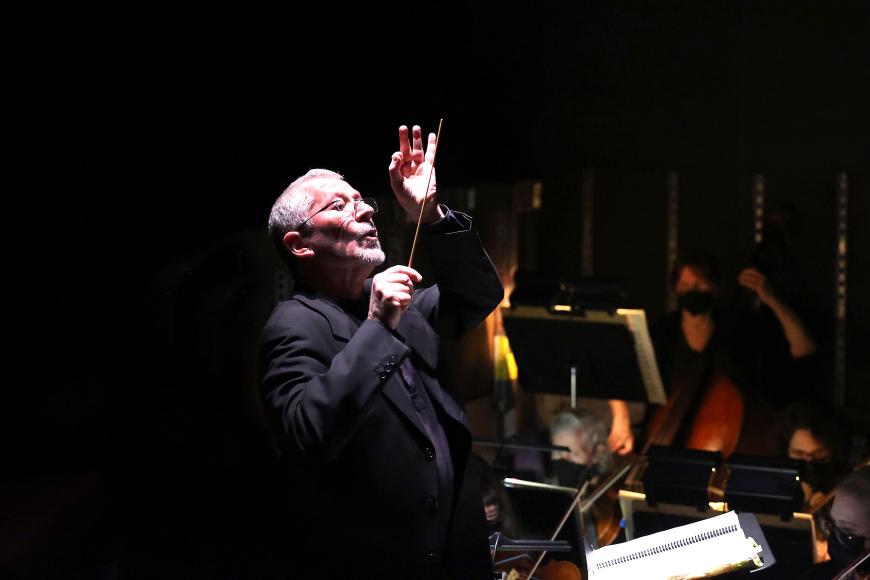
Like the surging waves that test the title character’s sailing ship in The Flying Dutchman, powerful voices and the turbulent feelings they expressed surged through the compact confines of Palo Alto’s Lucie Stern Theatre on Friday, May 26. The production of Richard Wagner’s 1843 work (through June 4) closes West Bay Opera’s 67th season.
With his haunted looks, striding agitation, and deep-grained voice, baritone Robert Balonek made a striking Dutchman, the cursed mariner in quest of a wife to save him from damnation. The singer laid out the terms of his character’s dilemma, which compels him to come ashore every seven years in search of a faithful woman to redeem him, in an expansive but tautly delivered first-act aria.
Later, in his duet with another ship captain (bass-baritone Joshua Hughes as Daland, father of the Dutchman’s potential wife), Balonek nearly blew his vocal partner off the stage. There and elsewhere, the lead singer came off as a man who didn’t quite know or know how to control his own strength. While that quality effectively limned the Dutchman’s desperation, volume trumped vocal artistry at times.

Dramatically and musically, Balonek met his match in soprano Meredith Bloomfield, who sang the role of Senta, the woman poised to deliver the seaman from his fate. At once wary and wonderstruck, the couple poured out their hopes, terrors, and frenzied accord in a vibrantly voluptuous second-act duet. With a potent range, ringing timbre, and borderline cutting metallic sheen at the top, the soprano’s voice more than held its own against Balonek’s. Bloomfield’s acting was choice as well, her veil of modesty dropping away as the immersive possibilities of love began to emerge.
The second act yielded another highlight of the evening in tenor John Kun Park’s vital turn as Erik, Senta’s devoted suitor who tries and fails to warn her against her union with the Dutchman. Park’s singing, by turns warm and pleading, anguished and helplessly swamped by his own feelings, brought a deep dimension to the role. In one of the most arresting touches in the composer’s libretto, based on a Heinrich Heine tale, Erik recounts a dream in which he envisioned Senta’s acquiescence in her father’s decision to trade his daughter for jewels, precious stones, and other riches.
While Dutchman, like any work of art, can’t fully or fairly be judged by contemporary standards, the story’s commodification of women does require a very willing suspension of disbelief.
The opera matters more as an important inflection point in Wagner’s career. Widely regarded as the opera in which the composer began to find the motif-driven structures that would distinguish his later works, the Dutchman score features some telling use of recurring melodic figures along with bright musical illustration and colorful orchestration, as well as long-windedness (notably the extended choral passage at the top of Act 3).
The West Bay Opera Orchestra, under General Director José Luis Moscovich’s baton, struggled to do justice to the music. While the ensemble gave generally firm support to the principals, especially in their ensembles, there were also plenty of rhythmic stutters, missed notes, and patchy string intonation.

Peter Crompton’s well-conceived unit set of masts and ropes and other nautical details took on an impressive spatial aspect in Frédéric Boulay’s projections of ocean waves and wind-whipped ships and sails. Director Ragnar Conde provided clear and graceful blocking for the principals; the challenge of what to do with milling chorus members remained, as it often is, a largely unsolved problem.
Despite its lapses, West Bay’s Flying Dutchman proved absorbing throughout and moving at its peak moments. Powered by keen principal performances, three acts sailed by.

